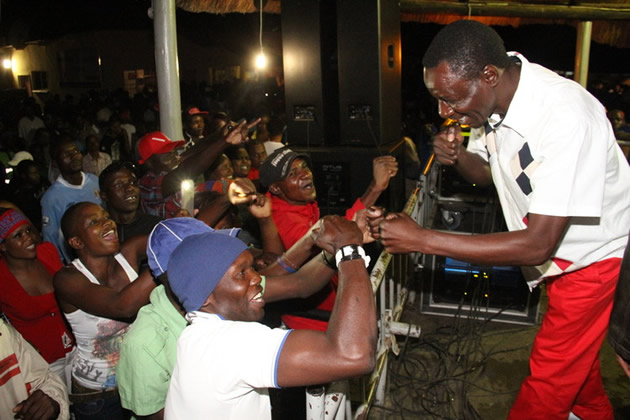Dancehall, sungura debate rages

Godwin Muzari Arts Editor
A few months ago, Star FM took the sungura-Zim dancehall debate to another level. Since the advent and popularity of Zimdancehall, there have been arguments at various platforms centred on the genre’s breakthrough and its comparison to sungura music’s popularity.
Star FM came up with a programme, broadcast every Saturday, when DJs Skywalker and Templeman go to various cities and towns presenting their “Sungura Versus Dancehall Clash” that has proved popular since its inception.
For a long time, sungura was rated as the most popular genre on the local music industry and most singers that have made names in the industry were sungura musicians or artistes pursuing related genres.
Although some of the musicians in the sungura bracket come up with terms to distinguish their styles, renowned artistes in the industry that include late greats like Marshal Munhumumwe, Leonard Dembo, Tongai Moyo, System Tazvida, Simon Chimbetu, Daiton Somanje and John Chibadura — among others — are rated as the best creators of good music.
On the list of living experts in sungura come names like Alick Macheso, Nicholas Zakaria, Leonard Zhakata, Tedious Matsito and Josphat Somanje.
These are artistes that have managed to appeal to the mass market and penetrated remote parts of the country with their styles. They have performed in rural areas, mines, farms, cities and towns and generally became big names in the industry.
A number of musicians have taken other genres such as rhumba, urban grooves and gospel but sungura has been highly rated over most of these genres.
Local groups that did rhumba and urban grooves have shifted from their genres, fused them with other styles or quit the art. In all these developments, sungura remained on top of the game.
However, a couple of years ago came a genre now known as Zim dancehall.
This genre has brought a serious wave on the local arts industry and also unearthed gems of talent among young people, especially ghetto youths.
Now, names like Killer T, Soul Jah Love, Lady Squanda, Seh Calaz, Tocky Vibes, Shinsoman, Ricky Fire and Freeman among others are popular on the local music scene because of Zim dancehall.
They have collectively written a serious piece of history and the writing will be on the wall for all to see in the coming years.
At first, many people — music critics included — concluded that the genre would simply fade away like the urban grooves wave. But Zim dancehall continues to dominate various entertainment forums in the industry.
Sungura musicians, who commanded popularity and made waves on charts and at various platforms, now admit that Zim dancehall is a force to reckon with.
The admission is subtle at times, but the signs are very clear. Macheso sometimes performs dancehall-styled acts at his shows and Suluman Chimbetu has gone to the extent of collaborating with Soul Jah Love on the track “Nyuchi” in apparent acknowledgment of the power of Zim dancehall.
This development has inevitably sparked debate on the local showbiz scene. Some sungura fanatics believe the genre still dominates because most of the big names in the industry pursue this genre. On the other hand, Zim dancehall artistes, who are mainly the young, say their type of music has surpassed sungura and they also claim that sungura will be a genre of the past in the near future.
This debate has led Star FM’s Skywalker and Templeman to go to various places to rate the genres on the ground.
They compare songs from the two genres and adjudication comes through crowd responses and also online voting during the programme.
They have gone to Chitungwiza, Chiredzi, Gweru and Masvingo with their concept and their clash has brought mixed results.
Star FM sales and marketing manager Piwayi Dzuda recently indicated that votes for Zim dancehall music dominate on the ground while online votes show that sungura is more popular. So, which one is the popular genre and what does this paradox reflect?
“I think we have more people voting for Zim dancehall on the ground because the young music followers dominate our events. We call the programme ‘Chatsva nePacific Sungura versus Dancehall’ and entrance to the events is free,” said Dzuda.
“Zim dancehall takes the lead at the live events but online voting favours sungura. I think it is because online voters are those mature people that have always followed sungura over the years and the debate is exciting. We will continue with the programmes until February next year and we will see how it goes and come up with the ultimate winner between the genres.”
The programme is an exciting affair that sees the DJs taking turns to select the best tunes in their respective genres. Skywalker plays sungura while Templeman unleashes dancehall tunes. It has become part of popular Saturday afternoon radio listening while the events have also been well subscribed in the areas where it has been held so far.
But the programme is only a reflection of the ongoing debate about the two genres.
Tanatswa Mukota of Budiriro believes sungura will always be the most popular genre.
“Zim dancehall is just one of those genres that come and go. It will go but sungura is here to stay. We had urban grooves music that was said to be popular but it fell by the wayside. The same will happen to dancehall. Sungura is our music and the best artistes will be sungura artistes. This genre has been here for years and you cannot compare it to any other genre. It lasts long and will forever be here,” said Mukota. Owen Tapambwa from Highfield has a different opinion and sees Zim danchehall as the answer to music diversity in the country.
“I think sungura is outdated and people should begin seeing the power of Zim dancehall. They said it would die but it has not died and it will continue going for years. The music is set to go for years and I am sure it will always be here. Music is dynamic and there is room for new improvements. We will see developments in dancehall music and we will celebrate dancehall for many years to come. It is a versatile genre and a platform for our youths to show their creativity,” said Tapambwa.
A local music promoter says Zim dancehall shows now attract more people than sungura gigs but the dancehall musicians lack the “staying power”.
“We now have more people coming to dancehall shows that sungura gigs. The difference is that most dancehall musicians have few hits and fizzle out while sungura musicians have built bigger profiles. Zim dancehall shows also mean that we have to bring many musicians to one stage and you have to hire more than four musicians for a show to make sense. It is different with sungura music because one musician can play the whole night and have a commendable crowd. However, Zim dancehall music is better in terms of business at the moment,” he said.









Comments